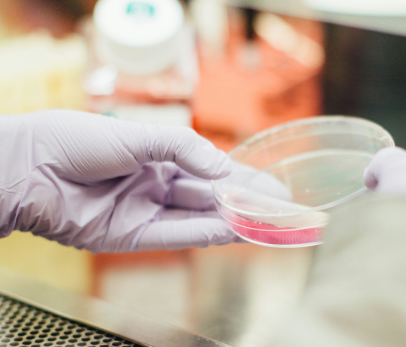Your Impact 2023/2024
Thanks to you, we’re drafting the roadmap to cure cancer
For four decades, Terry Fox has inspired people like you from around the world to run and ride, pedal and paddle, wheel and walk, and to donate in Terry’s name. Over the years, you’ve given more than $900 million to bring hope and healing to generations of cancer patients.
The money you raise supports world-class cancer research through the Terry Fox Research Institute (TFRI). TFRI invests your donations in the very best scientists in laboratories, clinics, and hospitals around the country.
In this report, you’ll read about some truly remarkable scientists and the transformative cancer research they’re bringing to life right now thanks to your support!
We are profoundly grateful to everyone on this journey. To the kids and communities who host Runs, lemonade stands, BBQs, and fun fairs. To the volunteers and supporters who organize, participate, and donate. To the researchers, clinicians, and patient partners who are helping us to better understand, diagnose, treat, and prevent cancer.
Thanks to you, every day we take a step closer to a world without cancer.

Dr. Jim Woodgett
President and Scientific Director
Terry Fox Research Institute

Michael Mazza, CFRE
Executive Director
Terry Fox Foundation








This Year’s Report
Your generosity is making a life-changing difference in the lives of cancer patients and their families across Canada and beyond.
Every cancer diagnosis is devastating – but when it comes to research funding in Canada, some of the deadliest cancer types are underfunded relative to their cost to patients and society.
When you give to the Terry Fox Foundation, your donation supports high-impact research by the Terry Fox Research Institute that makes the greatest difference where it matters most – in the lives of patients.
To allocate its resources, the Terry Fox Research Institute has international experts evaluate the excellence and the potential for impact of all its research projects.
This approach allows donors to be confident that their investment is supporting the top 5% of Canadian researchers and their science.


Investment per program
Programs
Investment
Projects
Researchers
Research & Funding Partners
TFRI Research Grants Programs
$19.1 M
49
272
66
Marathon of Hope Cancer Centres Network
$24.6 M
127
375
100
Digital Health and Discovery Platform
$200 K
0
0
52
Total
$43.9 M*
176
595**
175***
*This amount reflects our direct investment in research and does not include the costs of operating TFRI’s programs and projects. TFRI’s total expenses in the 2023-24 fiscal year were $47,093,578.
**A number of researchers work on several projects across program types. While these individuals are counted in more than one program type, the total number displayed at the bottom reflects the individual number of researchers we fund: 595.
***Many of our research and partner institutions are part of more than one of our initiatives. While these partners may be counted in more than one program, the total number displayed reflects the individual number of partner institutions.
TFRI research grants Programs
Investment by cancer site


* This category includes our investment in projects that have non-specific cancer types.
** This category includes our investment in cancer types that received less than 3% of our annual funding, including colorectal cancers, gastrointestinal cancers, melanoma, ovarian cancers, cervical cancers, myeloma and sarcomas.
Your support fuels discoveries and drives progress toward better cancer outcomes!

New therapy duo enhances cancer-killing viruses
At The Ottawa Hospital, scientists have unveiled an innovative therapy to target and kill cancers by combining special cancer-fighting viruses with a promising new drug called pevonedistat.
These cancer-fighting, or oncolytic, viruses target and destroy cancer cells. But sometimes, cancer cells put up a tough defence, making the viruses less effective. That’s where pevonedistat comes in. It weakens the cancer cells’ anti-virus defenses, allowing the viruses to sneak in and do their job better.

Developing a model to explore treatments for rare, aggressive childhood cancers
One of our BC-funded teams has made significant strides in understanding and potentially treating cancers associated with DICER1 syndrome, a rare genetic disorder that mostly affects children. These cancers are caused by mutations in the DICER1 gene and pose a serious threat due to their aggressive nature and a lack of effective treatments. However, the team has successfully verified key drivers of these tumours.

Collecting the data needed to move precision medicine forward
Precision oncology uses a patient’s unique genomic and clinical characteristics to personalize their cancer treatments. While it has helped improve outcomes for some cancer patients, it’s still in its early days and is not yet available to all Canadians. This is partly due to the high-costs and partly to the marginal real-world evidence of its success. To broaden access, decision-makers need access to data that can help determine when precision medicine is most effective and when it should be paid for by health-care systems with scarce resources.

Identifying immune patterns to personalize ovarian cancer therapy
Patients with high grade serous carcinoma (HGSC), a type of ovarian cancer, have limited treatment options. Chemotherapy and PARP inhibitors are unable to completely control the disease, which often metastasizes and recurs.
Immunotherapy – harnessing the body’s natural defense against cancer –
has shown success in other cancers but, so far, not for patients with HGSC.

Altering the gut microbiome to improve response to immunotherapy
The gut microbiome is the collection of trillions of microbes that live in our digestive tracts. In recent years, researchers have found the composition of the gut microbiome (that is, the combination of bacterial species that live in our gut) plays an important role in many aspects of our health, including our response to certain cancer therapies.
In this context, altering the gut microbiome has emerged as a promising area of cancer research.
Reflecting on the MOHCCN’s Year of Data Acceleration
In March 2023, we launched the Year of Data Acceleration for the Marathon of Hope Cancer Centres Network: a blueprint to exponentially increase the speed at which we were growing our Network and accruing cases to the Network’s Gold Cohort.
Mission accomplished! A year later, the strategy was a resounding success!
- Full genomic profiles in the MOHCCN Gold Cohort went from 888 in January 2023 to 4,287 by the end of the fiscal year.
- Cases with full clinical data rose from 0 to 1,095.
- Institutional memberships increased from 24 to 34.
- Gold Cohort-contributing cohorts grew from 62 to 99.
- Research Project Grant Agreements jumped from 19 to 117.
Our incredible growth wouldn’t be possible without the 600+ people who are now part of the Network. Today, we introduce the Year of Capacity Building. This reflects our strategy to expand the Network, enhance data ingestion, and include underserved communities. Inspired by Terry’s legacy, we’re paving the way for more Canadians to join our Marathon of Hope Cancer Centres Network.
Tracking our growth over time
Year
Investment
Projects
Researchers
Institutions
2023–2024
$24.6 M
127
375
100
2022–2023
$15.3 M
61
148
25
2021–2022
$14.1 M
–
128
12
Your Hard work in 2023
$9,672,625
Raised through the Terry Fox Run
$14,210,443
Raised through the Terry Fox School Run
3,980 Teams
9,233 Schools
578 Communities
$1,057,349
Raised through international Terry Fox Runs
190 Events
33 Countries
Our 2023 School RUn Ambassadors
Meet Calvin
When he was five, Calvin was diagnosed with leukemia. For 3½ years, he had chemotherapy every day. It was a long haul that left him feeling tired, nauseous, and headachy. Today, Calvin is 11. He enjoys baseball, basketball, hockey, cooking, and sewing. And he loves animals, especially his dog Darwin. When he grows up, he wants to be a doctor, scientist, cook, or policeman so he can help others. Asked what he would say to other kids facing cancer, Calvin replied, “I might give them a hug.”
Dear Terry,
You’re my hero. When I was sick, lots of people didn’t know what to say to me. It’s important to talk to kids going through treatment like they are any other kid. Like you, I’d make sure these kids knew they had a friend.
I want you to know how much I admire you for trying to raise money to cure cancer especially when you weren’t feeling good and on one leg!
Meet Calvin
When he was five, Calvin was diagnosed with leukemia. For 3½ years, he had chemotherapy every day. It was a long haul that left him feeling tired, nauseous, and headachy. Today, Calvin is 11. He enjoys baseball, basketball, hockey, cooking, and sewing. And he loves animals, especially his dog Darwin. When he grows up, he wants to be a doctor, scientist, cook, or policeman so he can help others. Asked what he would say to other kids facing cancer, Calvin replied, “I might give them a hug.”

Dear Terry,
You’re my hero. When I was sick, lots of people didn’t know what to say to me. It’s important to talk to kids going through treatment like they are any other kid. Like you, I’d make sure these kids knew they had a friend.
I want you to know how much I admire you for trying to raise money to cure cancer especially when you weren’t feeling good and on one leg!
Meet Mia
Mia was two when she was diagnosed with acute lymphoblastic leukemia, a type of blood cancer. She spent a lot of time in the hospital receiving chemotherapy and steroid treatments. Today, she’s 17. She loves dancing, swimming, and going to concerts and plays.
Dear Terry,
Your determination was powerful beyond words. You were so pure-hearted. I think that’s my favourite thing about you. You never stopped fighting. And you continued doing the things you loved most, like sports. The money you raised, and the money the Foundation continues to raise, is the reason that so many people, including myself, are still here! Thank you!
Meet Mia
Mia was two when she was diagnosed with acute lymphoblastic leukemia, a type of blood cancer. She spent a lot of time in the hospital receiving chemotherapy and steroid treatments. Today, she’s 17. She loves dancing, swimming, and going to concerts and plays.
Dear Terry,
Your determination was powerful beyond words. You were so pure-hearted. I think that’s my favourite thing about you. You never stopped fighting. And you continued doing the things you loved most, like sports. The money you raised, and the money the Foundation continues to raise, is the reason that so many people, including myself, are still here! Thank you!
Thank you
From everyone at the Terry Fox Foundation and the Terry Fox Research Institute… From the researchers, scientists, and physicians whose work you support…
From the families caring for a loved one living with cancer… From the patients whose lives you’re helping to transform and improve. Thank you!

We still have more to accomplish together.
Canadians with cancer are depending on us – and on your continued support.
Thank you for bringing hope to those who need it most!
To view the Terry Fox Foundation Financial Statements in more detail, please click here.
For more information about the Terry Fox Research Institute, please visit their website
This year’s Board Approved Budget reflects revenues of $38.2 million, at a cost of $10.5 million.


